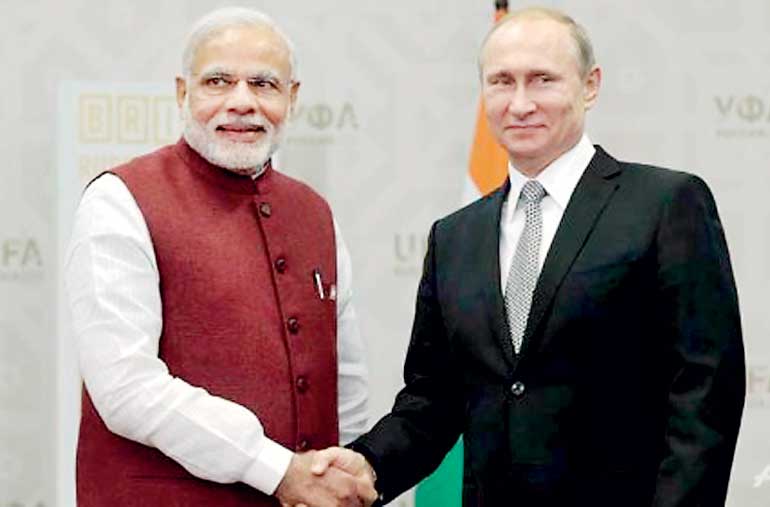Friday Feb 27, 2026
Friday Feb 27, 2026
Friday, 10 July 2015 00:00 - - {{hitsCtrl.values.hits}}

Russian President Vladimir Putin (R) shakes hands with Iran’s President Hassan Rouhani during their meeting in Ufa, Russia, July 9, 2015. Rouhani said on Thursday he was grateful to Russia for its efforts to secure an agreement at talks between six major powers and Iran on Tehran’s nuclear program. REUTERS

Russia’s President Vladimir Putin (R) shakes hands with Indian Prime Minister Narenda Modi during a meeting in Ufa, ahead of the start of a summit of the BRICS emerging economies - AFP PHOTO
AFP: UFA: Russian President Vladimir Putin on 8 July welcomed the leaders of emerging powers for a summit Moscow hopes will show it not isolated despite the standoff with the West over Ukraine.
The Kremlin sees BRICS, a group of emerging economies that includes Brazil, Russia, India, China and South Africa, as a growing economic and political influence to challenge Western hegemony.
Moscow’s ties with BRICS have become more vital amid the damage inflicted on Russia’s economy by Western sanctions, and Putin’s exclusion from the Group of Eight gathering, which met last month as the G7.
BRICS “illustrates a new polycentric system of international relations” demonstrating the increasing influence of “new centres of power,” Foreign Minister Sergei Lavrov said in a statement published on Wednesday.
Held this year in the city of Ufa some 1,100 kilometres east of Moscow, the summit itself starts on Thursday, following a day of bilateral meetings between Putin and the other leaders.
“I won’t hide that we are especially happy to see our friends from China,” Putin told Chinese President Xi Jinping ahead of talks. “We are well aware of the difficulties we have to face economically and in global politics, but by joining efforts we will without a doubt overcome all problems,” he added.
Putin also met with India’s Narendra Modi, South Africa’s Jacob Zuma and is set to speak with Brazil’s Dilma Rousseff after hosting a dinner with BRICS leaders. Also expected late evening is the Iranian President Hassan Rouhani, who will meet Putin on Thursday afternoon, right after the BRICS summit.
Taking place at the same time in Ufa is a meeting of the regional security grouping, the Shanghai Cooperation Organisation (SCO), to which Iran has applied.
BRICS “augurs the formation of a new world, in which the West will not dominate,” Fyodor Lukyanov, the chairman of the Council on Foreign and Defence Policy, wrote in Rossiiskaya Gazeta state daily.
Critics however say that while the summit is symbolically important for Russia, BRICS is not a strong political force due to the very different agendas and priorities of its members.
The summit is “compensation for one and a half years of a diplomatic blockade,” wrote Alexander Gabuyev of the Carnegie Moscow Centre. But, he added, “Moscow is likely alone in its euphoria about the double summit and emerging new geopolitical constructs.”
Among the tangible results of BRICS’s emergence has been the establishment of a BRICS bank to finance infrastructure projects in member states and developing countries. The bank, which was officially launched on Tuesday, will start funding proposals early next year, said Russian Finance Minister Anton Siluanov.
Sanctions have cut off access to Western borrowing for Russia, and Siluanov said that companies like oil giant Rosneft may now turn to the BRICS bank for funding. “The bank is an instrument for development, for economic growth,” Siluanov said, while ruling out any bailout loans to Greece.
Leaders on Thursday will discuss regional and global issues, including the Syria conflict, threat of the Islamic State group, the situation in Greece and Iran’s nuclear programme.